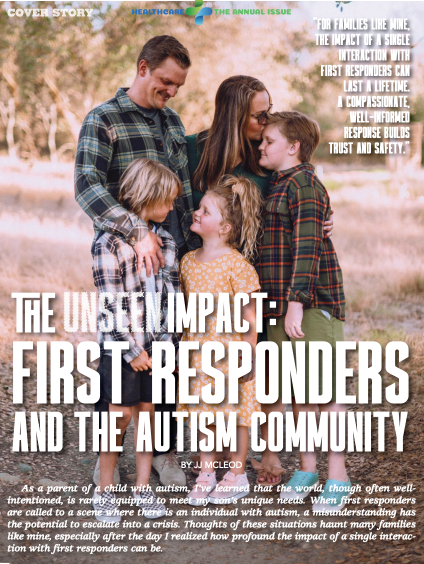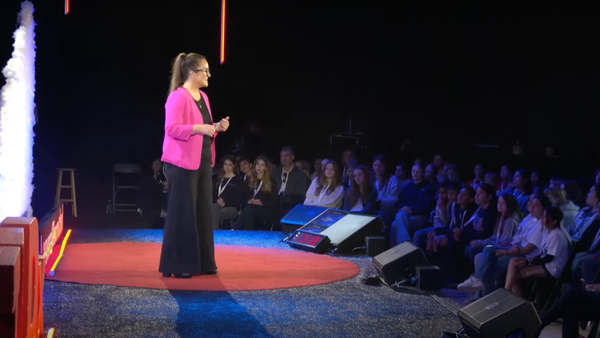The Unseen Impact: First Responders and the Autism Community

As a parent of a child with autism, I've learned that the world, though often well-intentioned, is rarely equipped to meet my son's unique needs. When first responders are called to a scene where there is an individual with autism, a misunderstanding has the potential to escalate into a crisis. Thoughts of these situations haunt many families like mine, especially after the day I realized how profound the impact of a single interaction with first responders can be.
That day started like any other in our household. My son, who often struggles with mornings, was having a particularly hard time. Stimming behaviors that morning, his way of regulating emotions, were more pronounced. To us, they were part of his natural rhythm. We made the call to keep him home from school, as we’d done before. But within hours, four police officers arrived at our door. Their presence turned our home into a scene of fear and confusion. The school misunderstanding his behaviors had called in a report. Autism wasn’t mentioned in the report!
When the police I was shocked. I had NO idea why they were there, I thought they had the wrong house. When they asked if my son was home I immediately got scared. I wondered why they wanted to know about my son. One police officer went and stood outside his bedroom door. I begged him to walk into the living room. I told him my son was asleep and if he opened my son's door he would be scared. He asked, "Why would he be scared?" I told him it would scare anyone, however my son had autism and he would not know how to process that or why the police were there.
Once I mentioned autism, the head sheriff told the police to leave and go wait outside while he talked to me. I was hysterical, crying to him about how this could happen and why the school did not disclose his diagnosis. I explained that this was a typical morning for our family. He apologized and said it was a part of his job to check on anyone who may need help. He told me if he had known my son had autism he would have handed it differently. To their credit, these officers listened to me. Had they not, the experience could have been far worse.
That moment stays with me to this day.
It wasn't just the terror of seeing my child perceived as a threat, it was the start reality that even those tasked with protecting us often don't understand autism. For many families, this isn't an isolated incident. It is a symptom of a much larger issue, a lack of training and awareness among first responders.
First responders play a critical role in our communities. They are the people we turn to in emergencies. They step into situations of chaos and uncertainty. But when it comes to autism, an invisible disability that doesn't neatly fit into predefined categories, even the best intentions can lead to harm without proper training.
Understanding autism isn't about memorizing a checklist. It;s about recognizing behaviors the may seem unusual, but are completely normal for the individual with autism. A child who doesn't respond to verbal commands may not be defiant, but overwhelmed. A person who avoids eye contact or engages in repetitive movements isn't dangerous, but trying to cope. Whiteout this understanding, interactions can escalate unnecessarily, creating trauma for individuals and their families.
Training first responders to recognize and adapt to these situations can make all the difference. It;s about equipping them with the tools to de-escalate, to communicate effectively, and most importantly, to see the person behind the behavior. Programs that incorporate role playing real-life scenarios, and input from the autism community are invaluable in fostering empathy and understanding.
For families like mine, he impact of a single interaction with first responders can last a lifetime. A compassionate, well-informed response builds trust and safety. It shows our children that they are valued members of the community, and reassures parents that help when needed won't come at the cost of their child's dignity or well-being.
Conversely, a negative interaction can shatter that trust, leaving families hesitant to call for help, even in critical situations. The trauma of being misunderstood, of seeing your child's behaviors misinterpreted as aggression or defiance lingers long after the moment has passed. For the person with autism these encounters can reenforce feelings of isolation and fear. First responders have a unique opportunity to change this narrative. Each interaction is a chance to create a ripple effect, to show not just the individual, but the entire community that they are seen, understood, and valued.
The path forward starts with acknowledgment. Autism awareness and training should be a standard part of first responder education, not an optional add-on. It’s about recognizing that invisible disabilities like autism are more common than many realize, and that the stakes are too high to leave this understanding to chance.
Families like mine don't just want to feel safe; we want to be partners in creating safety. We want to work with first responders, not against them. We want to work with them to build a world where every person regardless of their ability is treated with respect and care.
To the first responders reading this, know that your work matters deeply.
You have the power to not only save lives, but to shape them. By investing in training and understanding, you can transform fear into trust; misunderstanding into connection. You can be the difference between a moment that breaks a family and one that builds a bridge.
The autism community doesn’t expect perfection. We understand that every situation is unique and challenging. We do hope for progress, for a commitment to learning and growing alongside us. At the heart of it, we all want the same thing - a world that sees beyond the labels to the humanity we all share.
When that world exists, it will be because of people like you, first responders who took the time to listen, to learn, and to lead with empathy. Thank you for being part of our journey.
About the Author
JJ Mcleod, founded of Autism Embrace to serve families navigating neurodiversity by building a community of resources and friends so that every family to feel seen, supported, and ready to thrive. She's a Certified Autism Specialist and dedicated advocate with over 15 years experience. She's also a parent navigating this journey with her own child.




